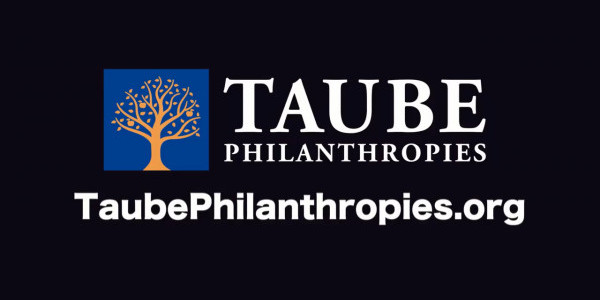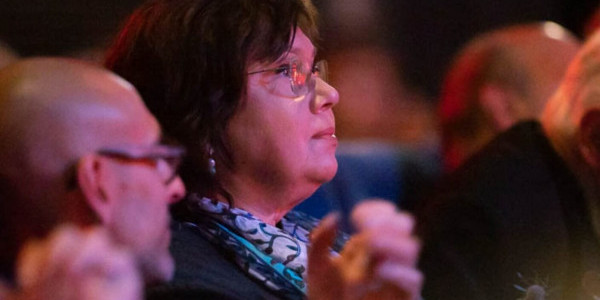Prof. Barbara Engielking uhonorowana Nagrodą im. Ireny Sendlerowej za 2021 rok
Fundacja Taube Philanthropies przyznała Nagrodę 10 maja 2021 w San Francisco
10/05/2021 | Na stronie od 11/05/2021

Source: Taube Philanthropies
English version below
Prof Barbara Engelking, Laureatka nagrody jest założycielkę i dyrektora utworzonego w 2003 r. cieszącego sie światowym uznaniem Polskiego Centrum Badań nad Holokaustem Polskiej Akademii Nauk. Prof. Engelking, socjolog i czołowy autorytet w dziedzinie historii getta warszawskiego, zapoczątkowała nowe kierunki w badaniach nad Holokaustem i interdyscyplinarną metodologią, opublikowała dziesiątki cenionych książek i artykułów, pod Jej redakcją powstało kilka tomów podstawowych źródeł Holokaustu i wspólnie z Jackiem Leociakiem opracowali najbardziej obszerną i autorytatywną monografię o getcie warszawskim.

Jako główna uczona i współkuratorka galerii Holocaust w Wystawie Głównej Muzeum Historii Żydów Polskich POLIN w Warszawie odegrała kluczową rolę w tworzeniu narracji historycznej na najwyższym poziomie naukowym, zdobywająć uznanue szerokiej i zróżnicowanej publiczności.
W latach 2014-2018 prof. Engelking przewodniczyła Międzynarodowej Radzie Oświęcimskiej.
W latach 2015–2016 była stypendydtką Ina Levine Invitational Scholar w U.S. Holocaust Memorial Museum w Waszyngtonie.
Jedną z jej najbardziej ambitnych prac jest Dalej jest noc: losy Żydów w wybranych powiatach okupowanej Polski, współredagowana z prof. Janem Grabowskim z Uniwersytetu w Ottawie i tekstami dziewięciu autorów. Opublikowane w 2018 roku dwutomowe, 1600-stronicowe opracowanie badań dziewięciu powiatów w okupowanej przez nazistów Polsce z małymi polskimi miastami - „pułapkami śmierci” na ukrywających się Żydów podczas Holokaustu.
Skrócona wersja anglojęzyczna ukaże się jeszcze w tym roku jako The Night Without End: The Fate of Jews in Selected Counties of Occupied Poland (Indiana University Press).
Nagroda im. Ireny Sendlerowej im. Taube Philanthropies '2021, nazwana imieniem polskiej działaczki społecznej, która ratowała żydowskie dzieci z warszawskiego getta podczas okupacji hitlerowskiej, została ogłoszona w poniedziałek 10 maja 2021 r., w trzynastą rocznicę śmierci Ireny Sendlerowej 8 maja 2008 r.
„Profesor Engelking jest wybitnym i szanowanym na całym świecie badaczem Holokaustu” - powiedział Tad Taube, prezes Taube Philanthropies. „Poprzez nagrodę im. Ireny Sendlerowej Taube Philanthropies wyraża nasze głębokie uznanie i szacunek dla jej wspaniałych osiągnięć”.
Plany corocznej ceremonii wręczenia nagród, która zwykle odbywa się na Festiwalu Kultury Żydowskiej w Krakowie lub w Muzeum POLIN w Warszawie, zostaną ogłoszone w najbliższym czasie.
O nagrodzie im. Ireny Sendlerowej Nagroda im. Ireny Sendlerowej została stworzona w 2008 roku przez Taube Philanthropies dla uczczenia pamięci Ireny Sendlerowej, którą Yad Vashem nazwał „Sprawiedliwą wśród Narodów Świata”. Nagroda przyznawana jest co roku tym, którzy wzorowo zachowali i rewitalizowali polskie dziedzictwo żydowskie. Nominacje do nagrody są oceniane przez panel członków rady doradczej Taube Philanthropies i żydowskich liderów kultury w Polsce.
Taube Philanthropies Od ponad 30 lat Taube Philanthropies jest liderem we wspieraniu różnorodnych organizacji edukacyjnych, badawczych, kulturalnych, społecznych i młodzieżowych w rejonie Zatoki San Francisco, w Polsce i Izraelu. Założona przez biznesmena i filantropa Tada Taube w 1981 r. i kierowana obecnie przez Tada i jego żonę Dianne Taube, działa na rzecz zapewnienia obywatelom wolności i możliwości realizacji ich celów i marzeń.
Wyróżnieni nagrodą im. Ireny Sendlerowej w latach 2008-2020
- 2008: Janusz Makuch, dyrektor Festiwalu Kultury Żydowskiej, Kraków;
- 2009: nieżyjący już Jan Jagielski, archiwista, Żydowski Instytut Historyczny im. Emanuela Ringelbluma;
- 2010: były Prezydent RP Aleksander Kwaśniewski;
- 2011: nieżyjąca już Magda Grodzka-Gużkowska, która z narażeniem życia pomagała Irenie Sendlerowej ratować żydowskie dzieci z warszawskiego getta;
- 2012: wybitni uczeni prof. dr hab. Maria Janion i dr hab. Jolanta Ambrosewicz-Jacobs, prof. UJ;
- 2013: Hon. Bogdan Zdrojewski, były Minister Kultury i Dziedzictwa Narodowego; Hon. Hanna Gronkiewicz-Waltz, Prezydent Warszawy;
- 2014: Małgorzata Niezabitowska, autorka i dziennikarka; Tomasz Pietrasiewicz, dyrektor Brama Grodzka - Ośrodek Teatralny NN;
- 2015: Krzysztof Czyżewski, dyrektor Fundacji Pogranicze; nieżyjący już dr Jan Kulczyk, Znamienity Darczyńca Muzeum Historii Żydów Polskich POLIN;
- 2016: Prof. dr hab. Monika Adamczyk-Garbowska, profesor literatury żydowskiej i jidysz na Uniwersytecie Marii Curie-Skłodowskiej w Lublinie; nieżyjąca już Maria Piechotkowa, wybitna architektka i badaczka polskiej architektury synagogalnej;
- 2017: Stefan Wilkanowicz, autor, redaktor, pedagog i działacz katolicki; Bogdan Białek, założyciel Towarzystwa im. Jana Karskiego i Instytutu Kultury, Spotkań i Dialogu;
- 2018: Norman Conard, amerykański pedagog, który zwrócił uwagę świata na Irenę Sendlerową; Ola Bilińska, badaczka kultury jidysz i muzyk;
- 2019: Zuzanna Radzik, badaczka i aktywistka ds. Stosunków katolicko-żydowskich; Adam Bartosz, etnograf i muzealnik;
- 2020: prof. Dariusz Stola, były dyrektor Muzeum Historii Żydów Polskich POLIN.
TAUBE PHILANTHROPIES NAMES PROF. BARBARA ENGELKING, LEADING AUTHORITY ON HOLOCAUST HISTORY, AS 2021 IRENA SENDLER MEMORIAL AWARD RECIPIENT
MAY 10, 2021, SAN FRANCISCO — Taube Philanthropies has named the founder and director of the Polish Center for Holocaust Research at the Polish Academy of Sciences as the recipient of its 2021 Irena Sendler Memorial Award. At this globally recognized consortium for Holocaust studies, established in 2003, Prof. Engelking, a sociologist and leading authority on the history of the Warsaw Ghetto, has pioneered new directions in Holocaust research and interdisciplinary methodology, published dozens of respected books and articles, edited several volumes of primary Holocaust sources, and produced, with Jacek Leociak, the most comprehensive and authoritative monograph on the Warsaw Ghetto. As lead scholar and co-curator for the Holocaust gallery in the 8-gallery Core Exhibition of the POLIN Museum of the History of Polish Jews, in Warsaw, she has played a vital role in creating a historical narrative that meets the highest scholarly standards, while delivering a compelling visitor experience for broad and diverse audiences.
Between 2014 to 2018, Prof. Engelking chaired the International Auschwitz Council. She held the U.S. Holocaust Memorial Museum’s Ina Levine Invitational Scholar, in Washington, DC, in 2015-2016. One of her most ambitious works is Dalej jest noc: losy Żydów w wybranych powiatach okupowanej Polski, co-edited with Professor Jan Grabowski of the University of Ottawa and with texts by nine authors. Published in 2018, this two-volume, 1,600-page study of nine counties in Nazi-occupied Poland identifies small Polish towns as “death traps” for Jews in hiding during the Holocaust. An abridged English-language version will be published later this year as The Night Without End: The Fate of Jews in Selected Counties of Occupied Poland (Indiana University Press).
The Taube Philanthropies’ 2021 Irena Sendler Memorial Award, named for the Polish social worker who saved Jewish children from the Warsaw ghetto during the Nazi occupation, was announced on Monday, May 10, 2021, marking the thirteenth anniversary of Irena Sendler’s death on May 8, 2008.
“Professor Engelking is an outstanding and internationally respected Holocaust scholar,” said Tad Taube, Chairman of Taube Philanthropies. “Through the Irena Sendler Award, Taube Philanthropies expresses our deep appreciation and respect for her stellar accomplishments.”
Plans for the annual award ceremony, which is usually held at the Jewish Culture Festival in Kraków or at POLIN Museum in Warsaw, will be announced in the near future.
About the Irena Sendler Memorial Award
The Irena Sendler Memorial Award was created in 2008 by Taube Philanthropies in memory of Irena Sendler whom Yad Vashem named a “Righteous Among The Nations.” Each year, the award is presented to those who have been exemplary in preserving and revitalizing Poland’s Jewish heritage. Nominations for the award are reviewed by a panel of Taube Philanthropies advisory board members and Jewish cultural leaders in Poland.
About Taube Philanthropies
For more than 30 years, Taube Philanthropies has been a leader in supporting diverse educational, research, cultural, community, and youth organizations in the San Francisco Bay Area, Poland, and Israel. Founded by businessman and philanthropist Tad Taube in 1981, and now led by Tad and his wife Dianne Taube, the organization works to ensure that citizens have the freedom and opportunity for advancement of their goals and dreams.
About the Irena Sendler Memorial Awardees, 2008-2020
2008: Janusz Makuch, director of the Jewish Culture Festival, Kraków; 2009: the late Jan Jagielski, archivist, Emanuel Ringelblum Jewish Historical Institute; 2010: former President of Poland Aleksander Kwaśniewski; 2011: the late Magda Grodzka-Gużkowska, who risked her life to help Irena Sendler rescue Jewish children from the Warsaw Ghetto; 2012: eminent scholars Prof. dr hab. Maria Janion and dr hab. Jolanta Ambrosewicz-Jacobs, prof. UJ; 2013: Hon. Bogdan Zdrójewski, former Minister of Culture and National Heritage; Hon. Hanna Gronkiewicz-Waltz, Mayor of Warsaw; 2014: Małgorzata Niezabitowska, author and journalist; Tomasz Pietrasiewicz, director of the Grodzka Gate—NN Theatre Center; 2015: Krzysztof Czyżewski, director of the Borderland Foundation; the late Dr. Jan Kulczyk, Distinguished Benefactor of POLIN Museum of the History of Polish Jews; 2016: Prof. dr hab. Monika Adamczyk-Garbowska, professor of Jewish and Yiddish literature at Maria Curie-Skłodowska University in Lublin; the late Maria Piechotkowa, renowned architect and scholar of Polish synagogue architecture; 2017: Stefan Wilkanowicz, author, editor, educator, and Catholic activist; Bogdan Białek, founder of the Jan Karski Society and Institute for Culture, Meetings and Dialogue; 2018: Norman Conard, U.S. educator who brought Irena Sendler to world notice; Ola Bilińska, Yiddish culture researcher and musical artist; 2019: Zuzanna Radzik, scholar and activist in Catholic-Jewish relations; Adam Bartosz, ethnographer and museologist; and 2020: Prof. Dariusz Stola, former director of the POLIN Museum of the History of Polish Jews.